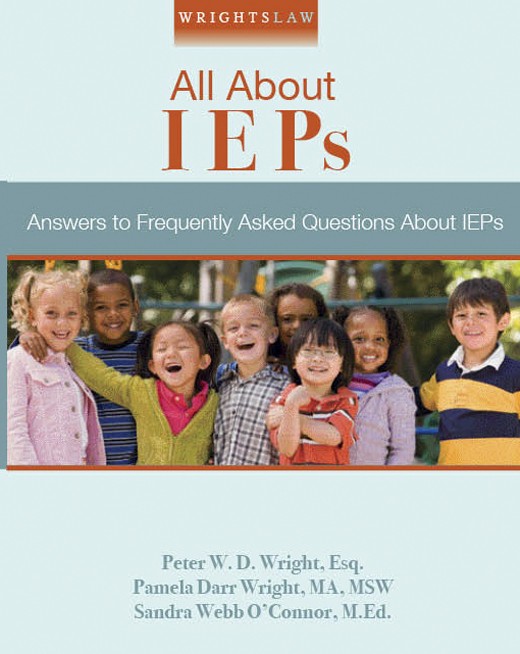I am a special education teacher with some specific questions to protect my students.
I have a meeting with a supervisor to discuss this and I want to know what my rights are and what the rights of the students are. I am being told I am not allowed to speak with parents until the IEP. I cannot ask them about goals, I cannot ask them about future goals; and this is an entirely homeschooling program.

I don’t know how familiar you are with the IDEA, the federal special education law, but the IDEA does not provide legal rights to teachers, with a few exceptions (for example, you should have access to your students’ IEPs) .
The law does provide an elaborate system of rights to students with disabilities and their parents – and these should benefit you as well.
One of the most important rights relates to parental participation.
If you have a copy of our book, Wrightslaw: All About IEPs, you’ll see that Chapter 3 is about Parental Participation.
Chapter 3 describes what the law requires schools to comply with re
- parental role
- parental consent
- parent participation
Here is a link to the TOC: https://www.wrightslaw.com/bks/aaiep/toc.pdf
If you have this book, you can use it and the legal requirements about parental participation in your conversation with your supervisor.
It’s quite possible that your supervisor has never actually read the law and doesn’t know what the law requires of schools and teachers.
School Staff Need to Encourage Parents to be Active Participants
As you know, many parents feel confused and intimidated at school meetings. But the parent represents their child’s interests. Parents are an essential part of the IEP process and are key members of the IEP team. They are not spectators.
School staff need to encourage parents to be active participants in the educational decision-making process.
If a supervisor or administrator does not allow a child’s teacher and parent to discuss:
- the child’s educational program
- progress or lack of progress
or, does not allow a teacher to encourage parents to think about long-term and short-term goals…
…that supervisor either does not understand what the law requires or doesn’t care what the law requires.
You need to put yourself on a fast track to learning about the legal requirements of IEPs- what schools are legally required to provide and do for these children AND their parents.
Learn what the law says about:
- IEP Teams and IEP Meetings
- Parental Rights & Consent
- Steps in Developing the IEP
- Placement, Transition, Assistive Technology
- Strategies to Resolve Disagreements






What about for Oregon is there any laws for my child struggling due to his disibility so they put him in a specific classroom for this and soon after he’s ripped of his education and they only allow him to come to school for an hour a day?!!! This has to be illigal to take my child’s education due to something he can’t control. This is not ok and is affecting the whole family financially . Please help.
The Oregon parent training and information project will be able to provide you with the information you need. http://www.parentcenterhub.org/find-your-center
Are there any laws in the state of Michigan protecting school staff from students with IEP’s? If a teacher assistant is attacked by a student, what rights do they have? Is the school required to continue attempting to educate a student who regularly attacks his/her teacher or other school staff?
I’m a speech language pathologist in private practice and many of my friends who are speech language pathologist in the schools are telling me they are not allowed to tell a parents during an IEP meeting that the child presents with an orofacial myofunctional disorders. They are told by their supervisors to “stay in their lane” or told “you will be written up for costing the school money” if they recommended the parent to seek outside recommendations from their pediatrician and dentist on how medical or orthodontic intervention to correct the child’s suspected tongue tie or high/narrow palate could improve speed up progress in speech therapy when working on their goals to improve their impairment articulation of the R and CH sounds. So no one says anything and the child ends up in speech therapy until they are 14 when they could have graduated when they were 6. What laws can help them? Is this a form of workplace retaliation? What are their protected practices? Can they only claim workplace retaliation after they are fired? What law can protect them when speaking facts about their clinical judgment in IEPs?
I second this question
What about the rights for teachers interacting with aggressive or misbehaved autistic students? To what extent is a teacher obligated to tolerate chasing everyday because scholar runs away when is time to line up for recess? To what extent tolerate physical aggressions when a scholar is pullin hair, headbutting, hittting, kicking, biting? When do parents participate in decreasing a behavior. When do parents are taken accountable for their child actions? It seems like now adays, all parents care about is buying a new and nice house and they think of school as a day care. “Here, deal with them, you teach them.” I have seen two examples of a autistic students being as indepentdent as theu can be, mostly because of parent participation. Another example of a student decreasing misbehavior when parents were bothered every time their child was misbehaving hitting teachers, and in one of the last meetings they admitted the student does not have a consequence for how he did at school. After that, parents started not offering tablet and pizza for the day if the scholar had not have a good day at school. This student’s behavior chaneged enormously. What are our rights as teachers?
Yes, parents can have an important role in shaping behavior. Teachers (& other educators) have the right, & responsibility to ask for support from district, & outside specialists. Even if teachers have some experience & knowledge about working with students with behavior issues; ADD; Dyslexia, Autism, etc. they need support, a “2nd pair of eyes”, & training. More, & more teachers are not feeling supported. Your examples are ones that need to be shared with other teachers, along with information from behavior specialists, & psychologists.
What are the rights of parents of children, who use cochlear implants. For the parents, who have chosen to get cochlear implants for their children, the children typically receive their cochlear implants before the age of 2. These parents are choosing to have their children focus on learning to listen to learn and speak. Our COE offers a total communication – in the approach, the teacher is supposed to use sign language and spoken language when working with the students. These parents would like to choose an auditory-oral approach and trust that this approach is being respected by those working with their children. I’ve heard that by law, parents of children with hearing loss, need to be offered an auditory/spoken language approach not just given the approach the COE chooses
This may be a situation where it depends on your state rules on this issue. You may be able to find information on the state education agency website, or your state parent training and information center can help you. http://www.parentcenterhub.org/find-your-center